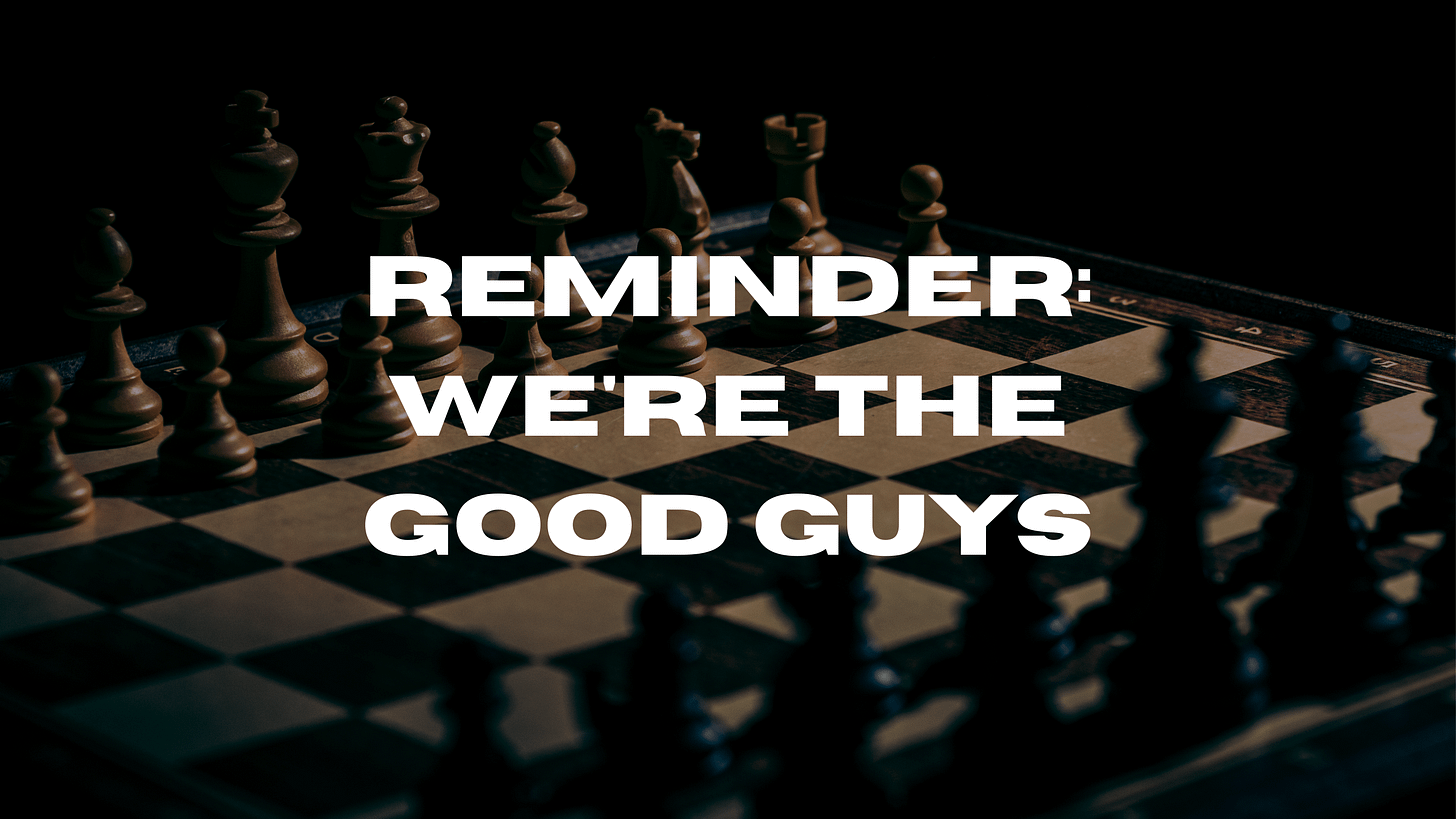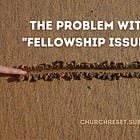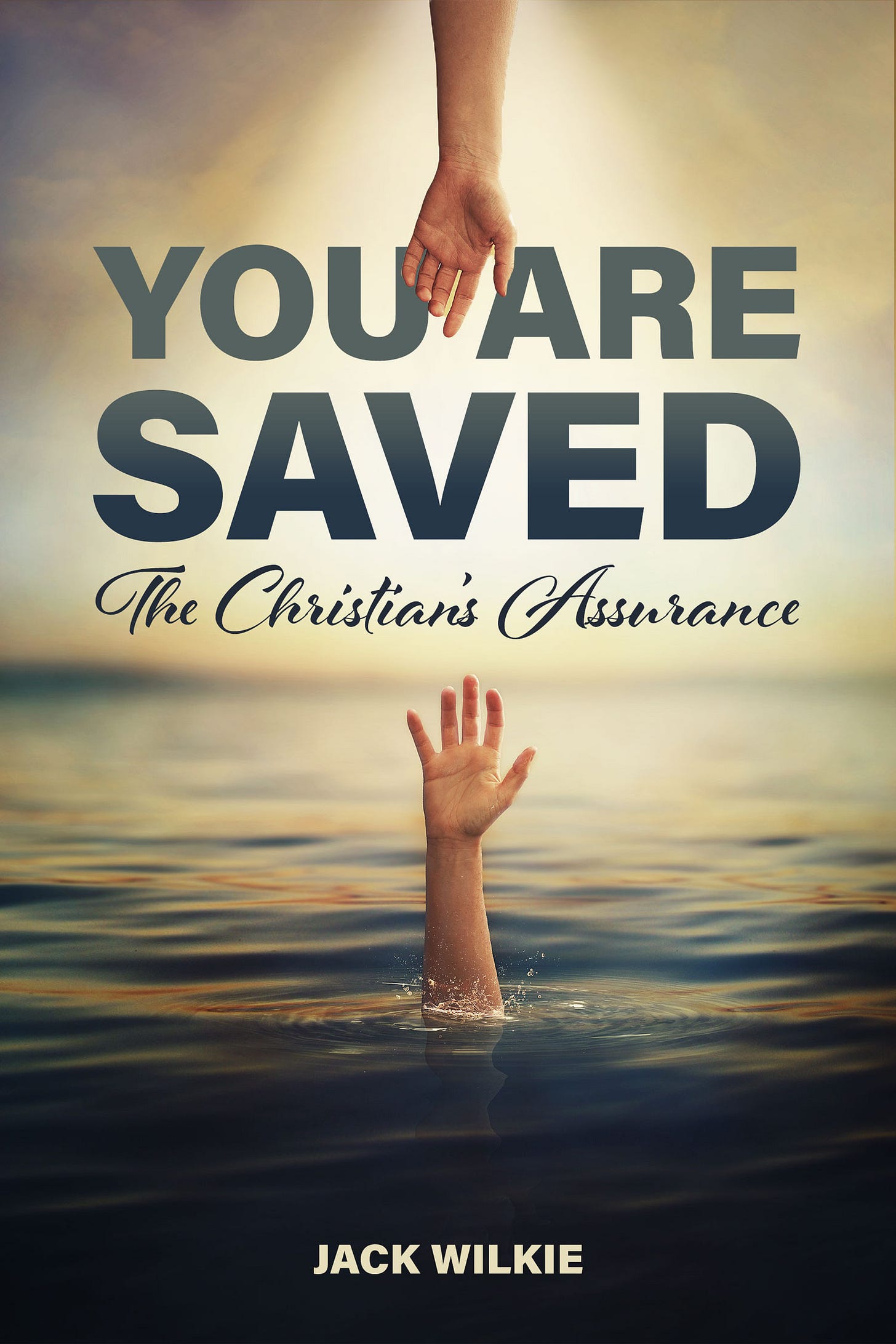Reminder: We're the Good Guys
Certainty isn't a sin
Don’t have time to read? As always, you can listen on the Church Reset podcast feed! (Available on Apple, Spotify, or your favorite podcast app)
In the last decade or so, we’ve had approximately 500 superhero movies that daringly posed the exact same question: “Are we sure the good guys and bad guys are all that different?”
That question gave way to “Let’s hear the bad guy’s side of the story” movies like Joker and Maleficent and Cruella. “Yeah, she wanted to kill puppies to take their fur… but here’s why she’s misunderstood.”
At the same time, the flaws of the good guys are always on display. They’re always morally ambiguous and their determination to stand up to the bad guys is questioned.
There was no better encapsulation of this than 2021’s Spider-Man: No Way Home (spoiler alert) in which Aunt May insisted the villains just needed to be rehabilitated rather than defeated. The classic “We’re no better than the bad guys if we hurt the bad guys” speech was trotted out. Predictably, this resulted in her death at the hand of those villains.
As both bad guys and good guys get pushed out of their respective black and white and into a gray, neutral territory, this same kind of thinking seeps into our doctrine.
Who are we to say someone definitively isn’t saved? Isn’t it arrogant to say we have right doctrine? Won’t people be turned away if we don’t come to them with ambiguity and a willingness to admit we might be wrong about Jesus? Certainty and “thus saith the Lord” kind of talk are off-putting, right? We don’t want to be “dogmatic,” do we?
In the same way, in our culture engagement it is often pitched as humble and loving to remain neutral, or to pretend our side is just as flawed as the other. Some are probably deeply troubled by the title of this article, offended by the idea that we’re the good guys, or that there even are good guys and bad guys.
Because of all of this, David repeatedly calling for God to crush his enemies while maintaining his own righteousness makes us seriously uncomfortable.
Can you read those Psalms and amen them in your own life? Does it feel right to pray for God to exercise His wrath on the wicked, knowing we have our own sins?
As for David, how did he know he was in the right? Was he really so different from the people he was calling God to punish?
Of course he was. God has not left us in the dark regarding what is pleasing to Him and what is not. But in our false humility we project a “Has God really said” mentality into any Scriptural diagnosis that would give us such certainty.
That’s why so many drone on and on about how all of us are “broken sinners.” But broken sinners have no moral authority to tell anybody they’re wrong or call them to repentance.
Here’s what we have to realize:
Certainty isn’t a sin.
Yes, certainty can be taken too far to the point where we don’t allow anybody to disagree with us without being called a rank heretic (as I wrote on here). This also doesn’t mean we are without sin, or above criticism, or beyond the need for improvement. We all stumble in many ways, as James says, and we should have the humility to admit that.
But for many people, that’s not the problem. Their problem is with feeling assured enough in their own beliefs and righteousness in Christ to call good, good and evil, evil.
They feel they are embodying a Christ-like humility by throwing everyone into the same pot of moral ambiguity. Me and Cruella DeVil, we’re not so different after all, the thinking goes.
No, you can be certain when you are righteous before God. Not because of your own goodness, but because of Christ (2 Corinthians 5:21) and the Spirit (Romans 8:14).
You can be certain that the bad guys are the bad guys. Romans 1 and all the other lists of sins (Galatians 5:19-21, 2 Timothy 3:2-5, Revelation 21:8, etc.) give us the clarity to say what is good and what is evil.
People who kill babies and indoctrinate children into sexual perversion and celebrate violence against their ideological opponents are exactly the kinds of wicked people David was talking about. It’s okay to pray that they will either convert or be stopped.
You can be certain you are saved, not because of your precise obedience but because He is faithful and righteous to forgive us as we confess our sins (1 John 1:9).
You’ll find there are plenty of sins, but certainty isn’t one of them.
Notes
This week’s podcast is a “Think Deeper essentials” kind of episode. Go here to listen and subscribe.
New chapter release coming this Thursday - ‘God Wants You To Be Sure.’
Become a supporting subscriber to get access when it drops!






"Gray areas are darkness in disguise." Stay in the light and don't compromise.
Excellent article and true. The scripture is absolute truth without which we have no hope. It is the anchor of the soul. Sometimes it's our attitude or lack of communication skills that causes the problem. It's true that the scripture requires us to be members of the church The one Jesus built. But you can't say to someone that truth in this way. It you don't become a member of the Church of Christ you are going straight to hell.
The scripture is true but we must learn the proper way to talk about. Please forgive typos I don't have my glasses!